Description
TRL3703 Assignment 3 (Portfolio) Semester 1 Memo | Due 16 May 2025. All questions fully answered. ASSIGNMENT QUESTIONS:
QUESTION 1
Case Study: Call for ‘affordable air travel for all’ – an article by 02 April 2025 – by Christiaan Schultz
The Portfolio Committee on Transport has raised concerns over what it calls “predatory pricing” and overbooking practices in South Africa’s low-cost airline sector, suggesting that deregulation had failed to benefit poor travellers as originally intended. The transport committee received briefings on anti-competitive behaviour in the low-cost carrier market during a joint meeting with the Portfolio Committee on Trade, Industry, and Competition on Tuesday, April 1. The National Consumer Commission (NCC) was currently investigating these concerns, but the committee believed a full parliamentary enquiry might be necessary. Legal counsel would also be sought on the best course of action. The NCC launched an investigation into FlySafair in January after the airline admitted to overbooking flights in a social media post, sparking outrage on social channels among passengers, as reported by Travel News. Following the committee meeting, Committee Chairperson Donald Selamolela expressed disappointment in how deregulation had played out, stating that it had led to “unmitigated chaos where the only thing that matters is accumulation of profit”.
STUDENT PLAIGIARISM DECLARATION
I declare hereby that this is my own work and not the work of anyone else. I understand what plagiarism is and the rules of the University of South Africa regarding plagiarism. I understand that I will receive a mark of 0% should I copy any section/part/sentence etc. from any source be it books, internet, or any other relevant source.
_______________________________ _________________________
Student name & surname Signature
_________________________
Date
TRL3703_FINAL WRITTEN PORTFOLIO_ASSESSMENT 3 – S1_ 2025
Page 3 of 8
Selamolela said some low-cost carriers were benefiting from regulatory advantages meant for budget airlines while charging passengers full-service airline prices. No advantages “…No player should enter the arena on a low-cost model and then abruptly decide they will play in a different league,” said Selamolela. “The low-cost carrier industry does not need a bully who just violates the law. Inaction on this matter will not help us resolve anything. Crucially, we ought to be able to answer the question of what makes these low-cost carriers budget airlines. The situation where one got benefits of being a low-cost carrier and yet charges at full-service cost should be disallowed.” However, an airline insider told Travel News that, in reality, in South Africa there were no benefits or advantages at all for budget carriers and that all airlines operated off the same level playing field, both budget and legacy carriers. Parliament is now calling on aviation industry entities and government departments to propose legislative amendments to ensure that the low-cost model results in affordable travel for South Africans. All key stakeholders, including the NCC, the Competition Commission, the Department of Trade, Industry, and Competition, and the Department of Transport, were present at the meeting. A follow-up meeting has been scheduled with low-cost airline representatives. “We want legislation that truly improves the conditions of our people,” Selamolela concluded. Kirby Gordon, Chief Marketing Officer of FlySafair, told Travel News that the airline would wait for any processes to conclude before addressing the outcomes.
Available at: https://www.travelnews.co.za/article/call-affordable-air-travel-all
Read the case study above and then answer question 1.1 below.
1.1
In reference to the case study on maintaining affordability amongst the low-cost airlines in South Africa, and from what you have learnt from Learning Unit 2, and FlySafair’s overbooking its flights in January 2025, which affected passengers, briefly discuss how this airline and its counterparts could maintain affordability of flights for passengers by ensuring the following:
▪
Increased labour productivity (3)
▪
No frills (3)
▪
Lowering ticket distribution costs (4)
Each of these elements should be responded to inline and with reference to the case study, otherwise you will be penalised. Do not re-write the study guide nor give me an answer from ChatGPT.
(10)
TRL3703_FINAL WRITTEN PORTFOLIO_ASSESSMENT 3 – S1_ 2025
Page 4 of 8
QUESTION 2
2.1.
In international aviation, which airline held the longest monopoly in the industry and when was the industry opened to other airlines. Moreover, in relation to the South African aviation, briefly give the government stakeholders, with descriptions.
(7)
QUESTION 3
Read the scenario and answer the questions that follow.
Scenario:
In the past, for airlines and airport operators, the air cargo business was only a subsidiary business dependent on the passenger business (Choi & Park 2020:14). However, now, the air cargo industry, which has maintained a stable growth trend even during COVID-19, is seen as a new opportunity. Moreover, the more limited the recovery in passenger demand, the greater the air cargo growth expected.
3.1.
From this scenario, briefly discuss the new opportunities that the Covid-19 pandemic has brought forth, for both passengers and airlines. Your discussion should be split into two: passengers and business with examples on each.
(7)
QUESTION 4
Case study: Airlink passengers forced to disembark mid-runway at King Shaka International Airport – an article by Anelisa Kubheka (15 November 2024)
An Airlink flight approaching Durban from Gqeberha suffered a hydraulic system malfunction just as it approached the runway at King Shaka International Airport. The malfunction caused passengers to disembark from the plane before it could reach the terminal building on Friday. Airlink spokesperson Linden Birns said the pilot of the small plane, a 40-seater Embrae 135, noticed a hydraulic system indicator showing a malfunction on its approach to Durban. He added the plane landed on the runway with the unresolved malfunction, and the pilot stopped the aircraft before it reached the terminal building.
“While landing, unable to resolve it, they decided to disembark the passengers. This was all in terms of standard procedure from a safety point of view. If you have a malfunction alert, you want to ensure that everybody is safe before you do anything else, “said Birns. He added passengers were transported by bus to the terminals. “After going through all the systems and troubleshooting with the engineers, they resolved it within 10 minutes. “It turned out to be an anomaly, and the aircraft moved to the terminal building using its power. It was resolved quickly and not an issue of any significance. “Yes, it was unusual that it happened this way, but the pilots know the procedures clearly and agreed with the Civil Aviation Authority and Airport Operations that the malfunction has been resolved
TRL3703_FINAL WRITTEN PORTFOLIO_ASSESSMENT 3 – S1_ 2025
Page 5 of 8
Available at https://www.news24.com/southafrica/news/airlink-passengers-forced-to-disembark-mid-runway-at-king-shaka-international-airport-20241115
Referencing this case study, answer the following questions:
4.1.
Why should airlines perform maintenance?
(1)
4.2
Which type of maintenance do you think Airlink did not perform which led to this malfunction? Give reasons why for each type.
(4)
4.3
Which type of performance do you think Airlink performed to address this malfunction, give reasons why you have selected that specific type or types.
(4)
QUESTION 5
Case Study: ‘Don’t touch my pocket!’ South African passengers say airlines must pay for reducing their carbon footprint, not them by Annemarie Davis and Tracey Cohen de Villiers (University of South Africa)
Airline travel is a major contributor to anthropogenic climate change, amounting to about 4% of all global greenhouse gas emissions every year. Airlines must take specific measures to reduce, and ideally neutralise, their greenhouse gas emissions and environmental footprint. The airline industry and air travellers are aware of this. However, the question of who should pay for the transition to green air travel is still under debate. Charging consumers for benefits is not new. For example, the user-pays principle has been adopted to fund road infrastructure through road tolls.
But if the findings of our survey of airline travellers in South Africa are anything to go by, airline users don’t want to pay for airlines to become more environmentally friendly. We are social science researchers who want our research to inform real life practices. Finding a gap in the research on green business models for airlines, we set out to explore the environmental consciousness and consumer behaviour of domestic air travellers. Our aim was to find out whether green initiatives by airlines make a difference to people when choosing which airline to fly with. Our research centred on the South African airline industry, where we surveyed domestic air travellers who were jetting off from the OR Tambo airport in Johannesburg. We found that even though not all airline passengers were sure how air travel worsens climate change, they all agreed that airlines must find ways to become environmentally friendly. However, passengers don’t want to pay for this. Our research helps create a better understanding of the relationship between environmental consciousness and willingness to pay for green travel. This will help airlines assess all the different ways they can lessen the environmental impacts caused by air travel.
Paying more for environmentally friendly flights
We used social media surveys to get 394 air travellers to tell us how they chose the airlines they flew with. Most were female (60.4%) and primarily leisure travellers (62%). Almost 70% of the participants flew with low-cost carriers. We found that air travellers believed airlines should strive to conserve the environment and reduce their negative impact. We were
TRL3703_FINAL WRITTEN PORTFOLIO_ASSESSMENT 3 – S1_ 2025
Page 6 of 8
curious about whether travellers would be willing to pay “green premiums” (extra charges to offset carbon emissions) for this. Only 31.5% were in favour of this and 23.6% were indifferent. Of the people we interviewed, 41.9% were against paying a green premium, with one saying “don’t touch my pocket!”
We also explored the idea of a “green class” ticket, where eco-conscious consumers would pay extra for a greener flight option. But again, most air travellers believed the airline industry, not the passengers, should cover the expenses of climate change mitigation. This view was aligned to those of Australian air travellers in another study where air travellers psychologically distanced themselves from the “cost” of emissions from their flights.
How airlines can go green
Among other measures, airlines could use more fuel-efficient aircraft or sustainable aviation fuels. But this requires a large capital outlay and, for South African domestic aircraft, might only happen over a long period of time, especially if there was no increase in ticket prices to fund it. Knowing how air travellers feel about the environment is useful for airlines in their strategic decision making for green business models, which maximise environmental benefits beyond the level that can be achieved through traditional business models.
Air travellers are price-sensitive yet they value protecting the environment. This means airlines should offer green services that consumers perceive as valuable. These could include environmentally friendly products like reusable water bottles or biodegradable wet wipes. By making these products easily available, plane travellers can make greener choices with minimal effort.
Firstly, green attributes could become marketable items to air travellers and the airline could develop a green image from these efforts. In other words, passengers might start choosing airlines that become environmentally friendly over other, less-green airlines. Secondly, cheapest airfares could be replaced with value for money, while doing something good for the environment. Airline marketers could clearly communicate the value that consumers can derive from any green services. Finally, green efforts could also include reducing waste on-board, recycling on-board waste, reducing paper boarding passes and serving fair trade and organic products.
Green initiatives can generate extra revenue for airlines. But they shouldn’t just be a way for airlines to make more money. Instead, airlines should incorporate green initiatives so that they stand out from competitors. In the future, airlines that fail to include environmental practices in their operations and marketing strategies could lose market share and find that passengers opt for other, environmentally friendly airlines. Airline marketers should design and implement education programmes about the environmental impacts of flying. This will mean that the air travellers who haven’t considered the environmental consequences of their flying habits become more aware. These education programmes could also showcase anything the airlines do to reduce their carbon footprint.
Research has found that some airlines use eco-labels to share their product’s environmental information with consumers. An eco-label informs airline travellers about the environmental impact of their travel choices by showing the carbon emissions, the fuel efficiency, sustainable practices or offset initiatives from their flight. This allows travellers to make consumption
TRL3703_FINAL WRITTEN PORTFOLIO_ASSESSMENT 3 – S1_ 2025
Page 7 of 8
decisions that are both well-informed and sustainable, without compromising their freedom of choice. We argue that once consumers are exposed to knowledge, this awareness can lead to a heightened sense of responsibility and more environmentally responsible purchasing decisions. To meet the Paris Agreement goal of limiting global warming to 1.5˚C, emissions need to be reduced by 45% by 2030 and reach net zero by 2050. To achieve this, airlines and air travellers must all play their part in reducing environmental impact – even if those efforts touch their pockets! Airline travellers can no longer be simply passengers, oblivious to the impact of their actions. They should accept that the burden of flying greener is also theirs to carry.
Accessed at: https://theconversation.com/dont-touch-my-pocket-south-african-passengers-say-airlines-must-pay-for-reducing-their-carbon-footprint-not-them-240456
From what you have learnt in Learning Unit 8 of the prescribed study guide, and from the above case study, answer the following questions:
5.1
Seeing that South African passengers do not want to dig into their pockets but want to maintain a clean environment, what measures do you think the airlines could put in place in their operations to protect the environment, and not increase the ticket prices?
(5)
5.2
Furthermore, what other managerial initiatives could be put in place to maintain environmentally safe operations, for holistic operations?
(5)
QUESTION 6
6.1.
Let us assume that you have been hired as a consultant by the Airport Company South Africa (ACSA) to assist in improving the security challenges that are faced at the OR Tambo International Airport, and as part of your mandate, you have to provide a report of the identified security threats. On that note, name and briefly discuss 3 (three) recent actual security threats at the OR Tambo International Airport.
(6)
6.2
Aviation safety and security are extremely important issues in both passenger and cargo transportation. Aviation safety refers to the physical safety of an aircraft and the accidents and incidents associated with it. The safety of passengers, crew and cargo is one of the most important aspects of a journey.
Informed by the above introduction to aviation safety, give examples of recent air craft complications that have been experienced by the following airlines: SAA, Mango and FlySafair – name and discuss your examples.
(6)
TOTAL [55]















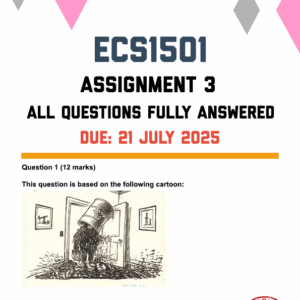



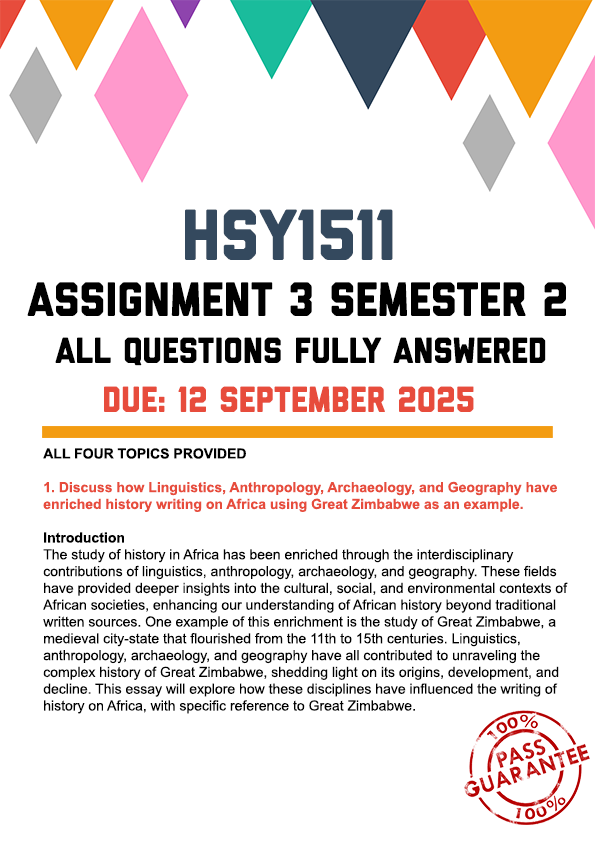
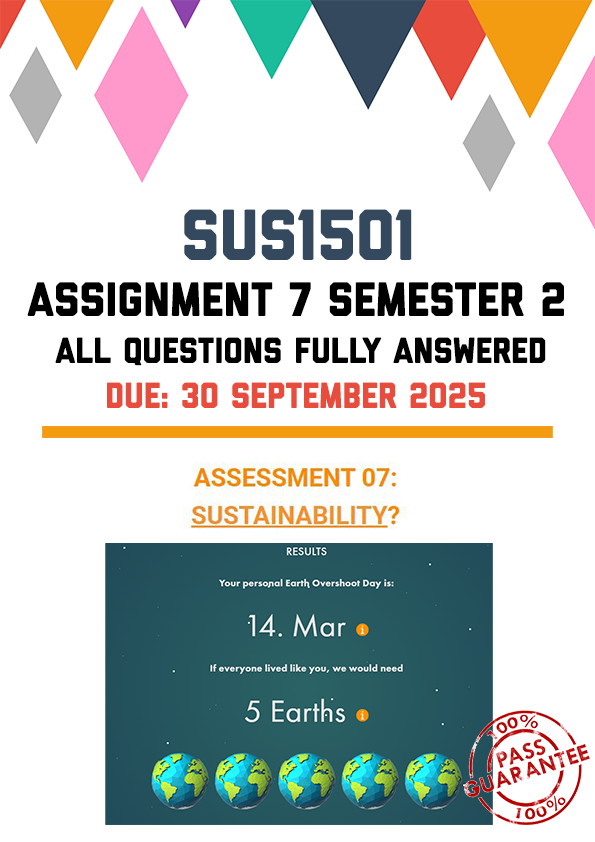
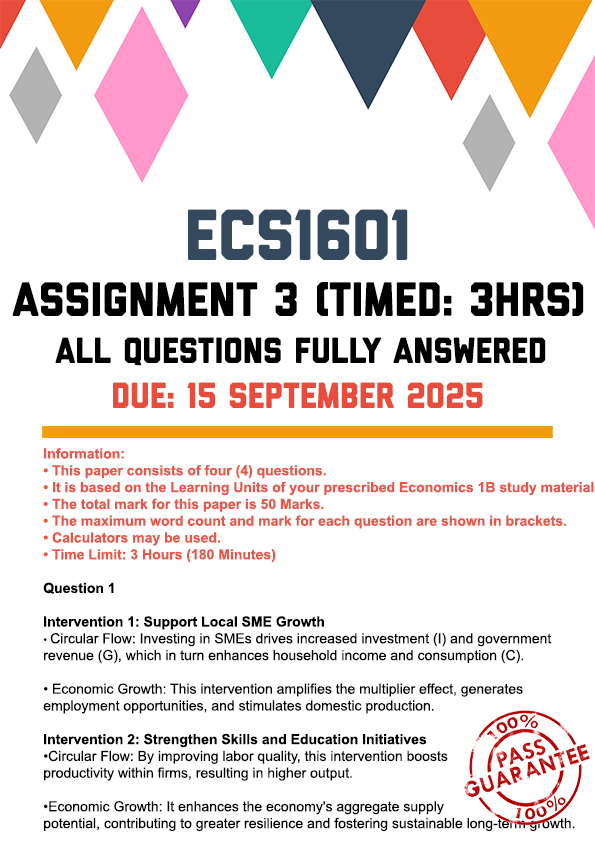
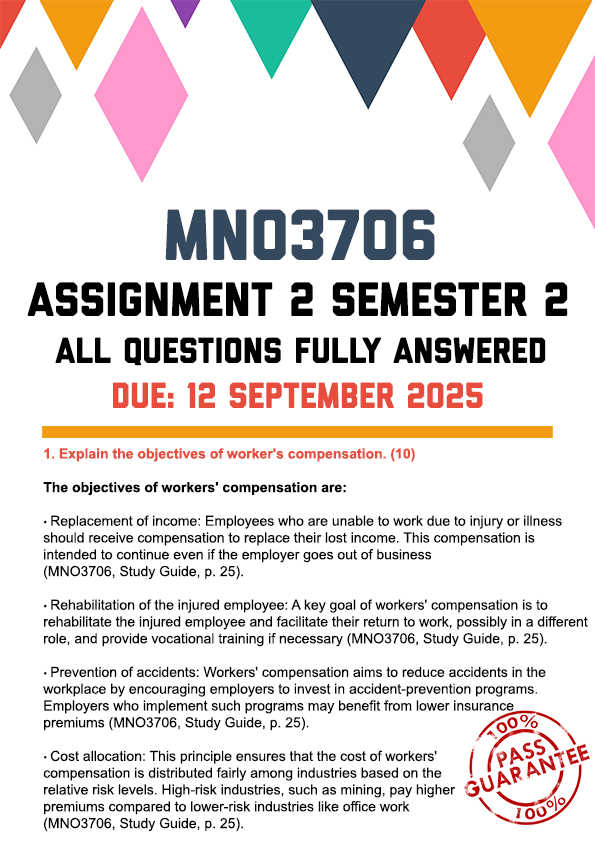
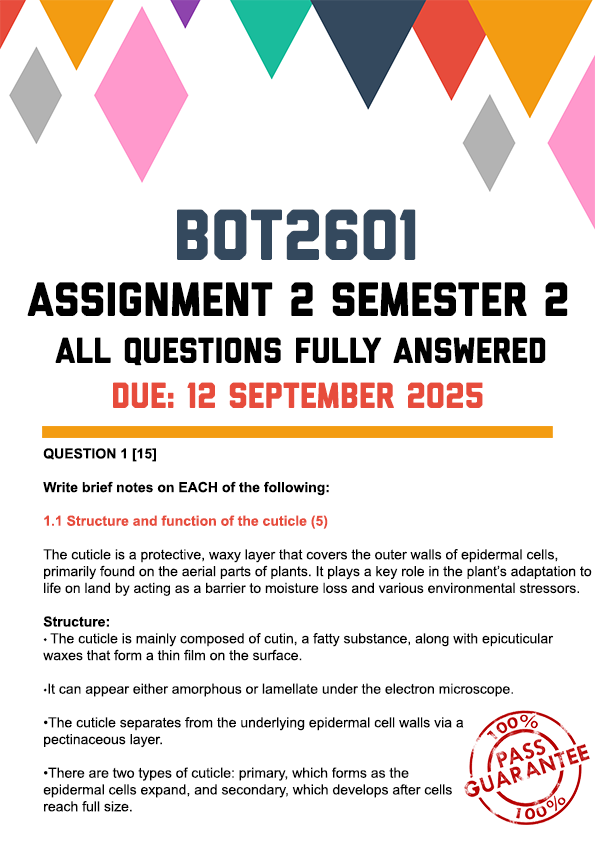
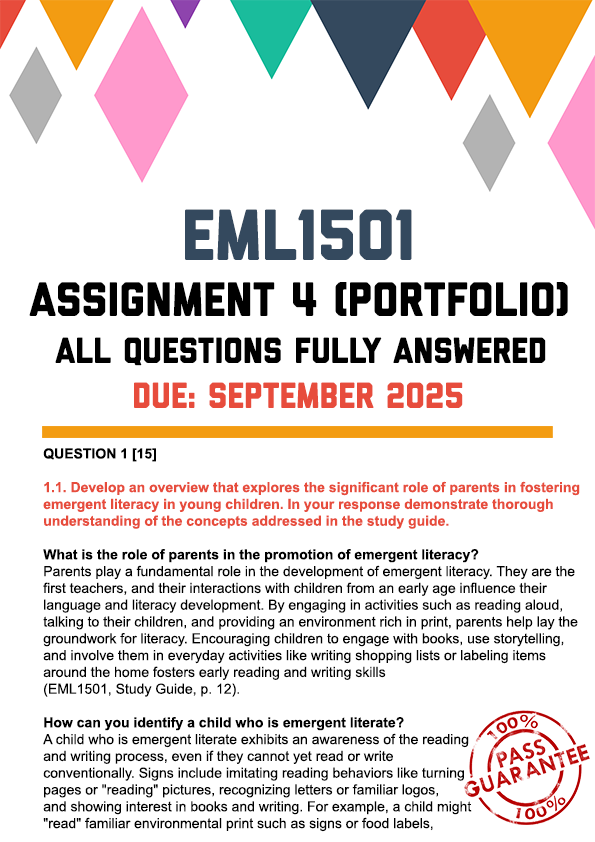
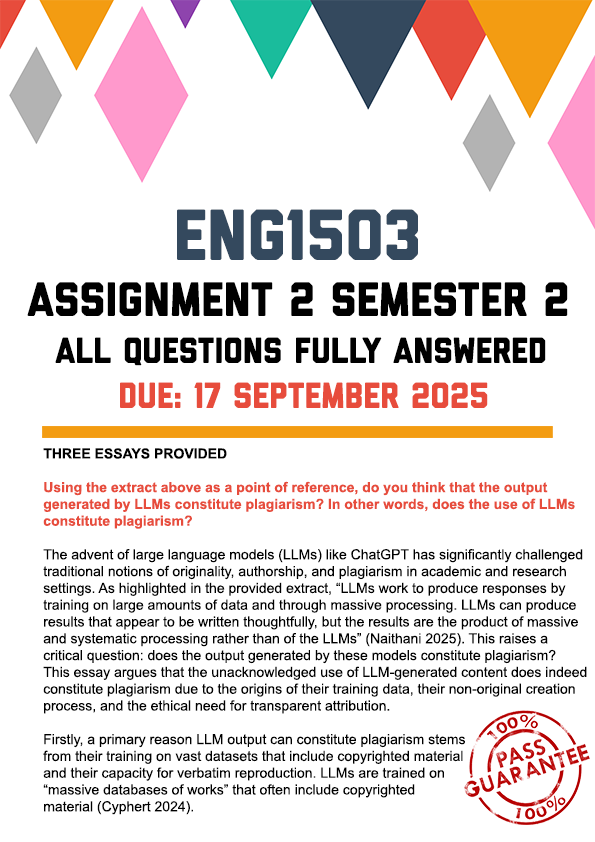
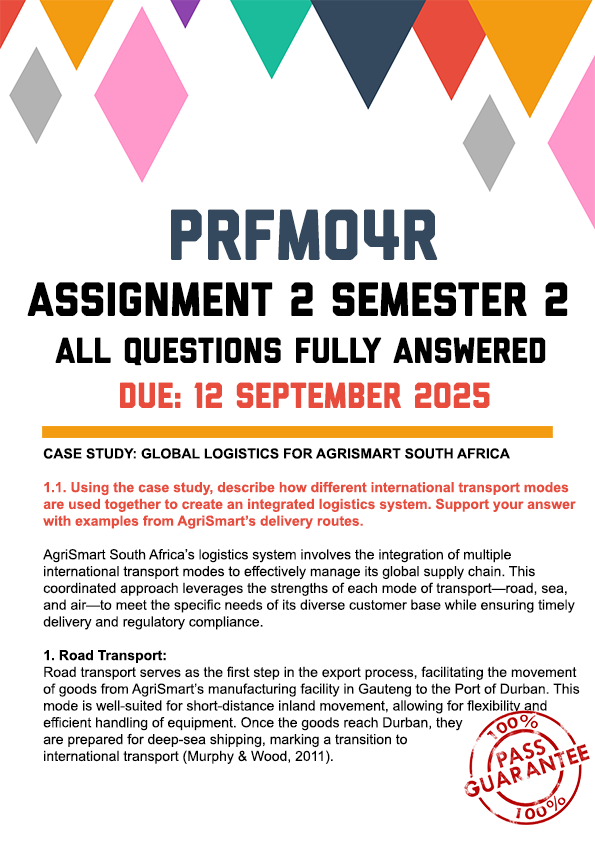
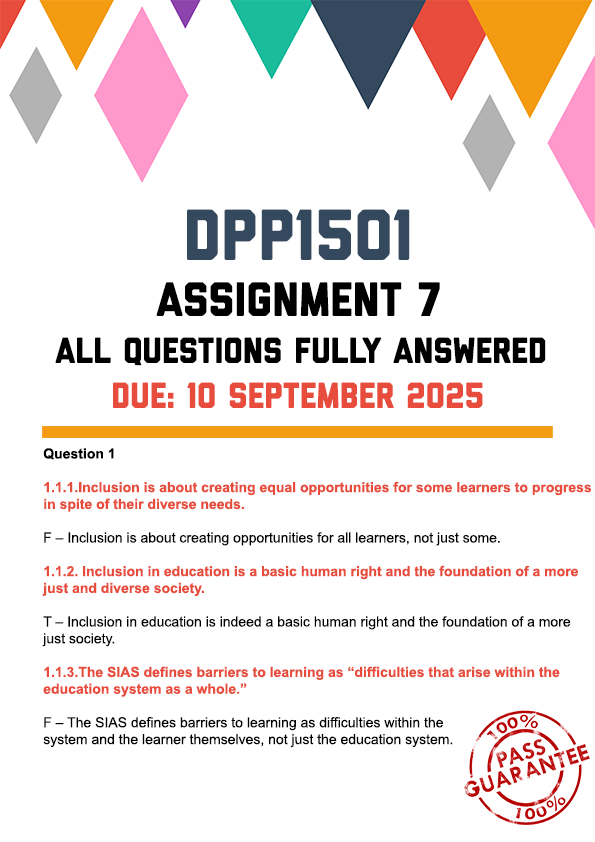

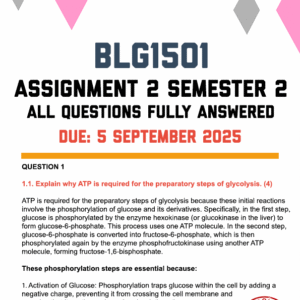
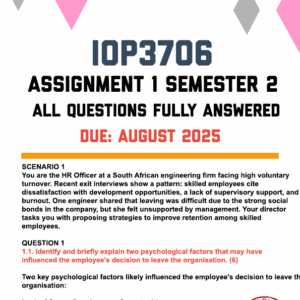

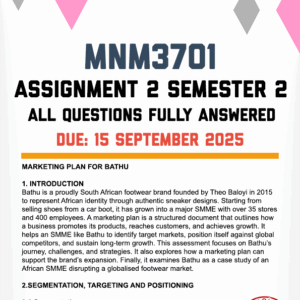





Reviews
There are no reviews yet.